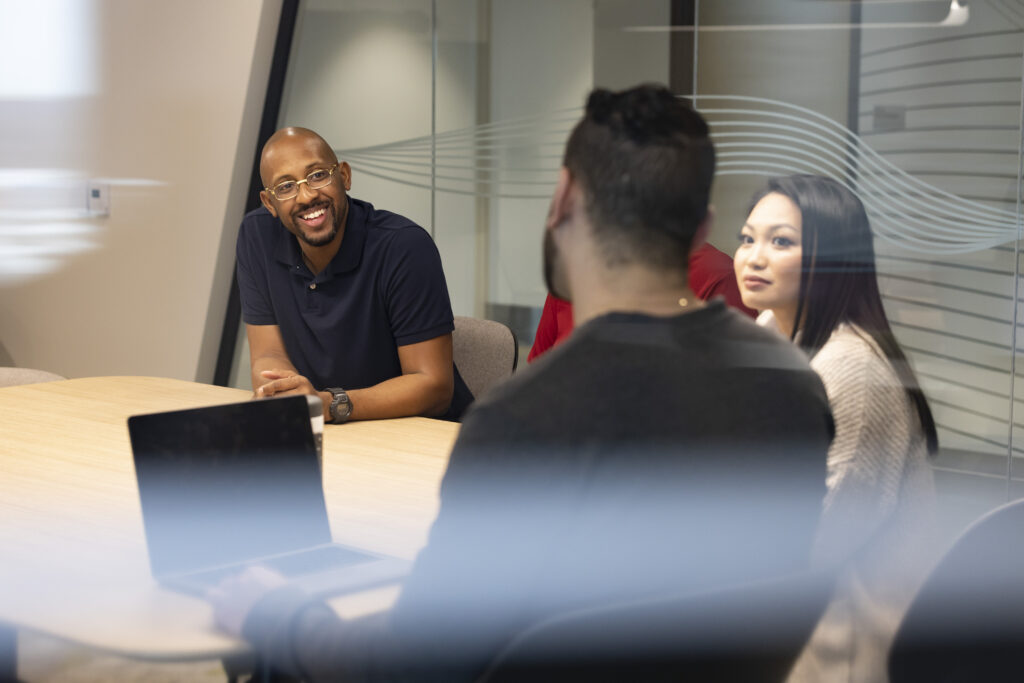GSE faculty publish a two-volume book sharing the national impact of “action research”
When students graduate with their EdD at Northeastern’s College of Professional Studies, they have already made an impact. That’s because the EdD program is centered on principles of “action research” and the dissertations involve comprehensive research, as well as thoughtful implementation.
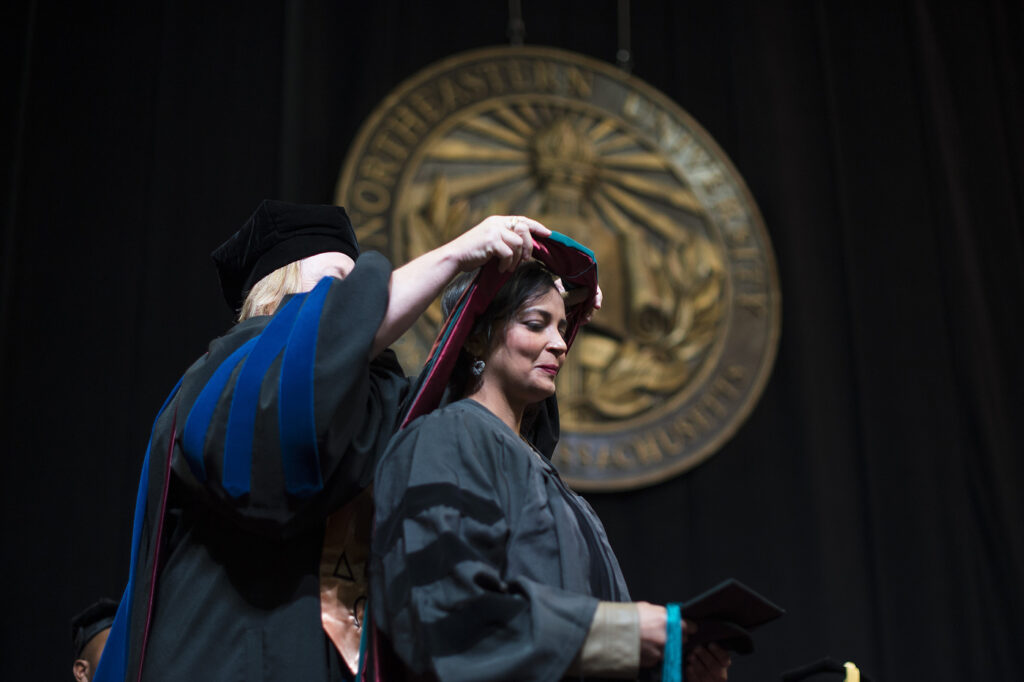
Sara Ewell, Joe McNabb, and Joan Giblin collaborated on a comprehensive overview of national research led by EdD students around the country. This two-volume book highlights the work of graduate students whose EdD programs share Northeastern’s partnership with the Carnegie Project on the Education Doctorate (CPED) – an international organization dedicated to transforming the Education Doctorate into the Professional Practice Doctorate in Education.
According to its website:
“Members are committed to rethinking advanced educational preparation through improved EdD program designs that offer academic rigor, practical impact, applied research, and value. CPED, the first action-oriented effort working to distinguish the EdD from the PhD, defines the EdD as one that prepares educators to become Scholarly Practitioners who can apply appropriate and specific practices, generate new knowledge, and steward the profession.”
The books are available at Information Age Publishing: https://www.infoagepub.com/authors/joe-mcnabb
We sat down with one of the collaborators, professor of practice and full-time faculty member, Joe McNabb, to learn more about the importance of this work and the value of Northeastern’s EdD program.
Q: What is “action research”
Action research is really at the heart of how we establish the EdD as an advanced professional degree — such as a Doctor of Nursing Practice (DNP) or Doctor of Psychology (PsyD) — versus a PhD which is more of an academic research degree. It moves away from traditional research by taking the step beyond just making recommendations, to actually implementing change based on rigorous research findings. For EdD students, when they graduate with their doctorate, they are armed not only with a degree but with a story of how their research resulted in meaningful change with significant impact.
Q: Why is this approach to “action research” so important?
Action research can empower all administrators in higher education to engage more effectively in resolving challenges in colleges and universities.
The first volume of the work we published, Faculty Development: Achieving Change Through Action Research, presents a compelling collection of chapters that explore faculty development through the lens of action research, tackling a diverse array of challenges with innovative solutions. Chapters include Cragg’s investigation into the barriers preventing faculty from implementing digital formative assessments in a top-tier business school highlights crucial issues of self-efficacy and time. Brewer’s examination of developmental English courses offers insightful structural and pedagogical strategies to enhance student success.
The second volume, Taking Action: Creating Sustainable Change in Student Affairs is an insightful compilation that utilizes action research to tackle complex issues in student development and support. Through a series of chapters, the volume delves into various facets of student life and administration, offering valuable findings and recommendations such as Tresselor-Gelok’s exploration of leadership styles in student affairs and Bevins’ work that highlights the benefits of peer-mentoring for first-generation students’ financial resource access.
Q: How did you decide what students to include in the book?
We did an open call for book chapters and reviewed all the proposals. Those that we kept were those that really demonstrated the impact of action research. We looked for highly rigorous research as well as measurable impact. The call was answered by universities across the country who are part of the CPED network, and the results were truly moving.
Q: Why did CPS decide to join the CPED network?
Sara Ewell was the vision for moving in this direction. We wanted our students to do something with their degree instead of just getting a piece of paper. She really created this vision in 2017 and 2018. We introduced the program in Fall 2018 — pivoting away from the traditional model so our students can take away high-impact skills.
This is even more meaningful when you consider the mean age of our students is 43. Most are mid-career professionals who are looking for ways to not only advance their careers, in higher ed, K-12, or non-profit spheres but make an impact. We have students from all over the country, representing community colleges, private liberal arts colleges, specialized colleges in fashion and design, prestigious global research universities, and Ivy League and public research universities. It really is a broad and diverse network of seasoned professionals generating remarkable work.
Transforming the future of education through a social justice lens.
Faculty in CPS’s EdD program prioritized compassion and connection in advancing curriculum development and research in a variety of education settings. As a result, 92% of graduating EdD students actively participated in change initiatives focused on social justice.
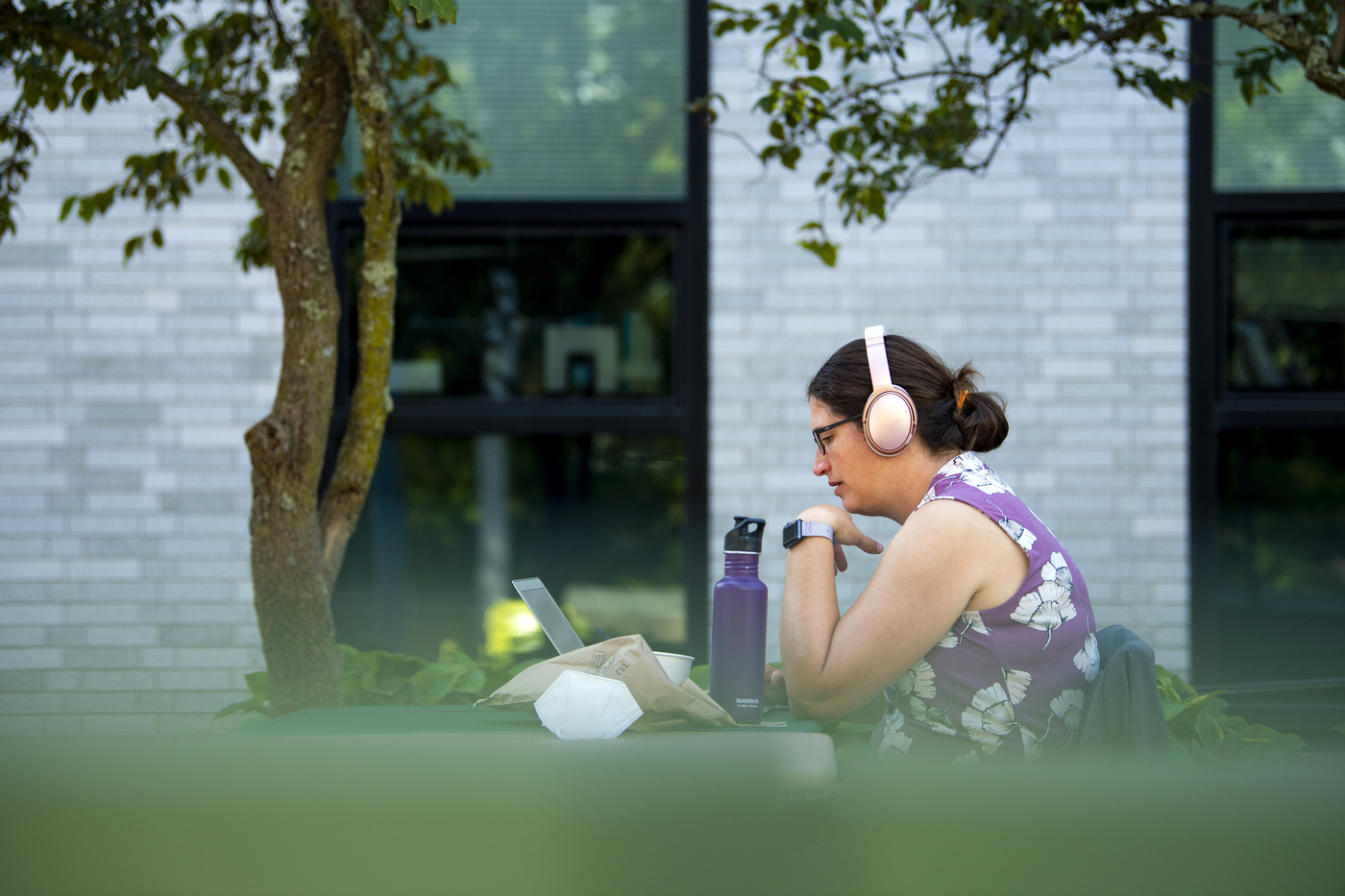
Learn more in this recently published paper “Developing and Sustaining Northeastern’s EdD Program During and Post Pandemic” in Impacting Education.
Journal on Transforming Professional Practice:
https://impactinged.pitt.edu/ojs/ImpactingEd/article/view/409/421
Writing your Problem of Practice & Application Support
This session is designed to help you choose your own problem of practice and write about it in your application to Northeastern. Every student in our program chooses a problem of practice and uses cycles of investigation to find innovative and systematic solutions to create change in their workplace and/or community.
Find more online events: Here
Writing your Problem of Practice & Application Support
This session is designed to help you choose your own problem of practice and write about it in your application to Northeastern. Every student in our program chooses a problem of practice and uses cycles of investigation to find innovative and systematic solutions to create change in their workplace and/or community.
Find more online events: Here
What Can You Do with an EdD?
Learn how a Doctor of Education can help you further your career, advance within your organization, and create meaningful change within your community. You’ll also learn more about Northeastern’s career design services and how they help you prepare for your future career moves.
Find more online events: Here
Discover Northeastern EdD
Join us for the unique opportunity to hear from our education faculty who teach in our global campus network. We’ll discuss the program curriculum, balancing work and school, developing a problem of practice, and more.
Find more online events: Here
Discover Northeastern EdD
Join us for the unique opportunity to hear from our education faculty who teach in our global campus network. We’ll discuss the program curriculum, balancing work and school, developing a problem of practice, and more.
Find more online events: Here
The Student Perspective: The shock and confusion that comes with being new to America
Oishika Hota, MS Media Innovation and Data Communication, class of 2024 Graduate, talks about her experience as an International student
One of the great privileges I have been offered is that of exposure. Starting from school all the way to graduate school here at Northeastern, every step I have taken has expanded my world significantly. But nothing has done the job like moving my life halfway across the globe.
Coming from Mumbai, Maharashtra, the most populous city in India, a land known for its vast array of cultures, languages, and traditions, I thought I had seen it all. However, the U.S. presented an even more intricate mosaic of backgrounds, beliefs, and practices. In India, a fusion of varied traditions and customs maintains its quintessential Indian identity despite the diversity. On the other hand, the US displays an intricate mosaic, presenting influences from diverse corners of the globe, resulting in a distinctive cultural mix. I feel like I am part of a melting pot, and navigating this diverse tapestry is one of my favorite challenges as an International Student in America.
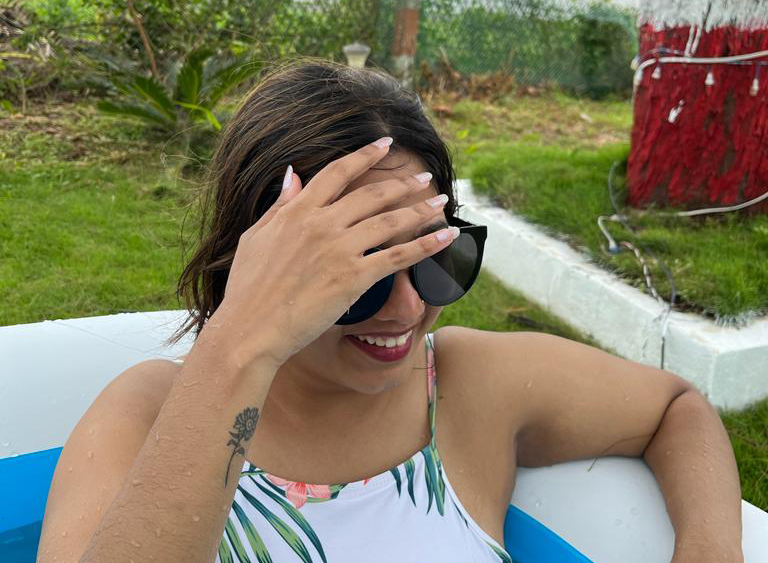
“There is a difference between knowing something and actually experiencing it.”
Oishika Hota
Whatever I knew about the U.S. before landing here was from my consumption of American pop culture. As a fan of chick flicks, Legally Blonde and Pitch Perfect shaped the way I perceived the American Collegiate experience. Apart from that, I had also watched enough TV shows and movies to anticipate a lot of what was thrown at me: the small talk, the food, and the cold weather. When Mindy Kaling made New York winters seem warm compared to Boston in “The Mindy Project,” I knew I had to be prepared. But there is a difference between knowing something and actually experiencing it.
For all the small talk America offers, I had a lot of trouble making friends — especially as a graduate school student, where forming a community in a class full of people from several countries is, to put it simply, hard. Overcoming these challenges required me to step out of my comfort zone. I began attending social events organized by the university and joining clubs related to my interests. It was nerve-wracking at first, but I pushed myself to strike up conversations, even if it meant starting with a simple “hello.”
I’m not a hater of American food, but there are a few dishes that just don’t hit the mark for me. Especially when they’re missing that spicy, flavor-packed kick that Indian dishes usually bring to the table!
While ingredients and restaurants can be found in Boston, the cost of materials and lack of variety ends up killing the taste. Even though I have learned how to cook, nothing beats the taste of food cooked in your actual home.
The cold, again, was something I was mentally prepared for, but coming from a tropical country, acclimatization did not come easy. I could finish bottles of moisturizers, but I did not understand why my skin was still dry, why I was still feeling cold after wearing my thickest jacket, which brand would protect me the best, and why it was so dark at 4:30 p.m. Despite the struggle, I found ways to keep pushing through. You find little moments of joy, like a warm cup of hot chocolate, a cozy night in with your favorite food and a movie.
With practice, my problems have changed. I feel better prepared for my second winter here, I am ready for the lull and sadness that comes with the darkness. It’s about acknowledging that this period is difficult, allowing yourself to feel it, and seeking support when needed. Whether it’s talking to a friend or a professional, sharing the burden of these winter blues can make a world of difference.
But at the end of all this, the hardest shock hasn’t been cultural, but that of the magnitude of my homesickness. Being far away from the close-knit family and the familiar comfort of home is a struggle. Learning to adapt to a new culture is by far not an easy task. The difficulty is what has sparked resilience in me and pushed me to explore this new landscape; to develop a new support system despite the cultural and the often not-so-edible reminders that I am in a country that is not mine.
“Whether it’s talking to a friend or a professional, sharing the burden of these winter blues can make a world of difference.”
Oishika Hota

Moving away from home has been the hardest thing I’ve ever done. But it has also been one of the most enriching experiences of my life. It was a slow but rewarding process. As I opened up and made an effort to bridge the cultural gaps, the move didn’t seem so bad.
Looking back at the whirlwind of the last year, I’m giving myself a mental high-five. The hurdles and bumps were tough, but they’ve turned me into a stronger and wiser version of myself. And for that, I am immensely grateful.
Open House: College of Professional Studies Bachelor’s Completion
Get Support in Real Time.
There’s a lot to consider on the path to completing your bachelor’s degree. Join us at our College of Professional Studies bachelor’s completion open house to speak with faculty and staff and get your questions answered. You’ll have the opportunity to learn about the many degree paths we offer and meet with faculty, staff, alumni, and current students.
Hors d’oeuvres and Northeastern University swag will be provided on a first-come, first-served basis.
Event Details
Date: November 2
Time: Registration begins at 6:00 p.m. Open house runs from 6:30 to 8:30 p.m.
Location: Northeastern University Visitor Center, 40 Leon St, Boston, MA 0211
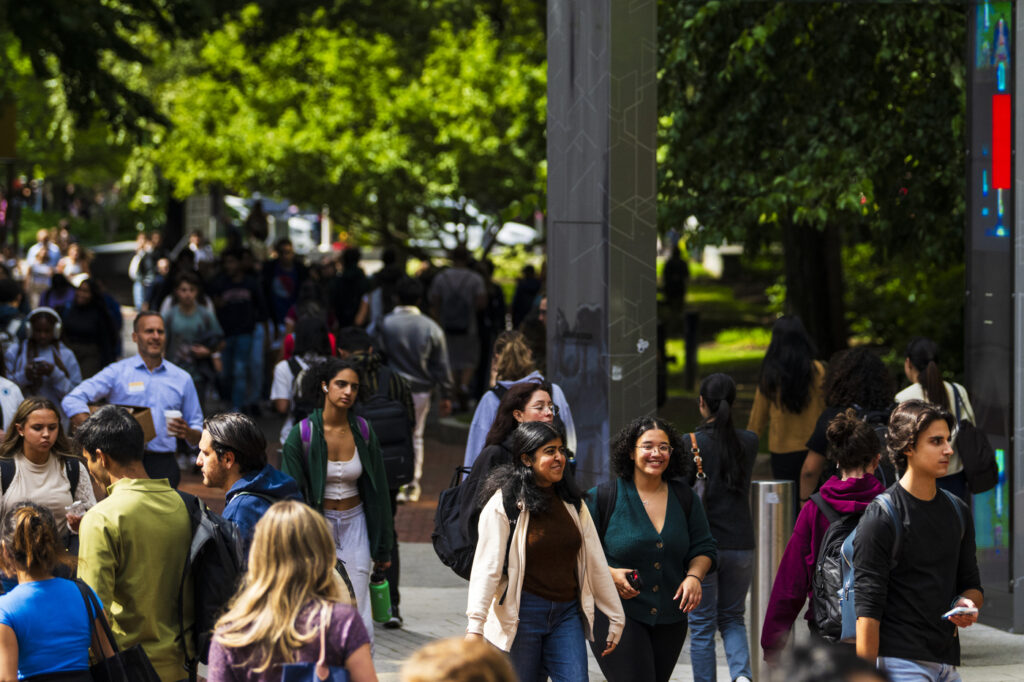
At this event, you’ll get personalized answers to all of your questions, including:
- What bachelor’s degree paths are available for online, hybrid, and in-person learning?
- What are the benefits of Northeastern’s experience-based education, and what experiential learning options are available?
- What is the application process?
- How do I know which of my credits will transfer?
- How much will completing my degree cost?
- How long will it take to complete my degree?
Learn more about your next steps and get connected with resources specific to your needs so you can move forward on your journey with Northeastern University.
Innovation Day 2023
Innovation Day is an exciting day-long symposium that invites full-time and half-time Faculty and Staff interested in building new programs and new learner services that are in line with the College’s strategic aims, to submit ideas to enhance our programs and learner experience at scale.
NOTE: This event is for the College of Professional Studies (CPS) Faculty & Staff only.
